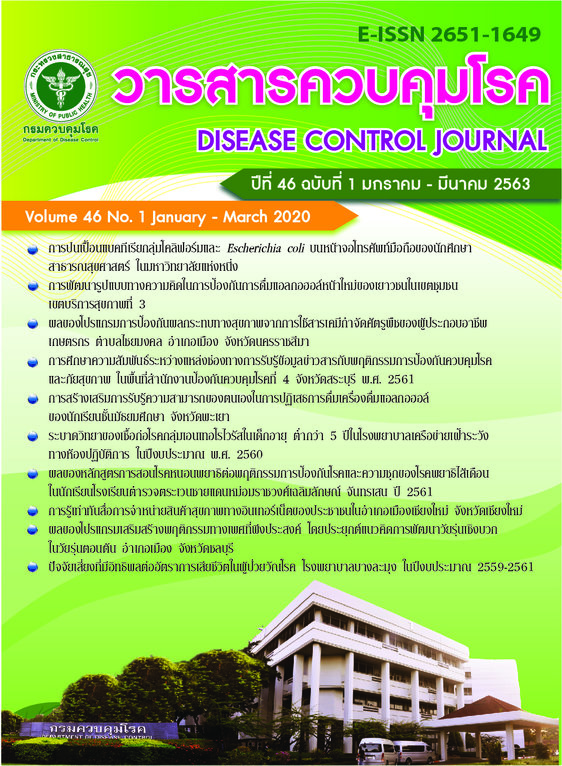The effects of promoting proper sexual behaviors by positive youth development program among early adolescents, Mueang District, Chon Buri Province
DOI:
https://doi.org/10.14456/dcj.2020.9Keywords:
positive youth development, sexual behaviors, early adolescentAbstract
This study was a quasi-experimental research having two groups with pretest-posttest design. The study aimed to examine the effects of promoting sexual behavior by positive youth development program among early adolescents in Mueang District, Chon Buri province. The participants were 67 grade-8 students. They were assigned to either an experimental group (n = 31) or a comparison group (n = 36). Students in the experimental group received positive youth development program (consisting of eight components, i.e. life goals, connectedness, self-confidence, character, caring/ compassion, and competence) for a duration of 8 weeks. The comparison group received the routine teaching program. Data were collected by using the questionnaire of sexual behaviors, with the reliability level between 0.856-0.902. Data were analyzed by using descriptive statistics; internal comparison within the experimental group using paried sample t-test; and inter-group comparison using independent sample t-test. The post-intervention results indicated that experimental group had achieved higher mean scores of sexual behavior than pre-intervention ones (p<0.001) and higher than those of the comparison group (p<0.05), significantly in sexual hygiene category and overall score. The findings suggested that this program should be introduced to promote proper sexual health behaviors among students.
Downloads
References
World Health Organization. Thailand 2015 global school-based student health survey. Bangkok: World Health Organization, Thailand Country Office; 2017.
Department of Disease Control, Ministry of Public Health. Guidelines for surveillance system analysis of 5-dimensional diseases, 2016. Nonthaburi: Bureau of Epidemiology; 2016. (in Thai)
Department of Disease Control, Ministry of Public Health. National disease surveillance (Report 506), 2008-2015. Nonthaburi: Bureau of Epidemiology; 2015. (in Thai)
Department of Disease Control, Ministry of Public Health. Surveillance behaviors associated with HIV infection among students in Thailand, 2014. Nonthaburi: Bureau of Epidemiology; 2015. (in Thai)
Department of Disease Control, Ministry of Public Health. Surveillance behaviors associated with HIV infection among students in Thailand, 2015. Nonthaburi: Bureau of Epidemiology; 2016. (in Thai)
Department of Disease Control, Ministry of Public Health. Result of promoting condom use project, 2012-2015. Nonthaburi: Bureau of AIDS, TB and STIs; 2015. (in Thai)
Becker MH. The health belief model and sick role behavior. Health Education Monograph 1974; 2:409-17.
Bandura A. The nature and structure of self-efficacy, source of self-efficacy: The exercise of control. New York: W.H. Freeman; 1997.
Cochran WG. Sampling techniques. 3rded. New York: John Wiley & Sons; 1997.
Bloom BS, Hastings JT, Madaus GF, Baldwin TS. Hand book on formative and summative evaluation of student learning. New York: Mc Graw-Hill; 1971.
Clark-Carter D. Percentiles. In: Everitt BS, Howell D, editors. Encyclopedia of Statistics in Behavioral Science. 3th ed. Hoboken, NJ: Wiley; 2005. p.1539-40.
Pawaree W. Preventive behavior on sexually transmitted diseases by condom of people in Watsisuk community, Chomthong District, Bangkok Metropolitan Administration. APHEIT Journal 2014;20:148-57. (in Thai)
LiXianhong, Lei Y, Wang H, He G, Williams AB. The health belief model: a qualitative study to understand high-risk sexual behavior in Chinese men who have sex with men. J Assoc Nurses AIDS Care 2016;27:66-76.
Chondaeng K, Rutchanagul P, Buaboon N. Factors influencing HIV preventive behaviors among male adolescents in a correctional institution. J Nurs Health Care 2018;36:43-51. (in Thai)
Rosenstock IM, Strecher VJ, Becker MH. Social learning theory and the health belief model. Health Educ Behav 1988;15:175-83.
Isaro N, Toonsiri CH, Srisuriyawet R. Factors predicting appropriated sexual behaviors among the lower secondary school students in Chanthaburi Province. The Journal of Faculty of Nursing Burapha University 2016;24:72-84. (in Thai)
Pented P, Chomson S. Factors affecting protection of sexual risk behaviors among high school students in Banklang Subdistrict, Wangthong District, Phitsanulok Province. BCNUT J Nurs 2019;11:62-79. (in Thai)
Watronachai N, Kredmongkol P, Powwattana A, Khan P. Safer sex practices among male vocational students in NakhonPathom province. J Health Sci Res 2007;1:38-46. (in Thai)
Chudjuajeen S, Singhasame P, Wuttisukpaisan S. Effects of perceived self-efficacy promoting for life skill enhancement on sexual health behavior of students. The Southern College Network Journal of Nursing and Public Health 2017;4:268-80. (in Thai)
Buarod T, Thongnopakun S. Sexual media literacy and preventive behaviors about sexually transmitted diseases among youth in university students Chon Buri Province, Thailand. Disease Control Journal. 2019;45:402-12. (in Thai)
Wongpanarak N, Siriwattanamethanon J. Perception of homosexuality in adolescent males. J Nurs Health Care 2012;30:42-9. (in Thai)
Thoma BC. Parental monitoring among young men who have sex with men: Associations with sexual activity and HIV-related sexual risk behaviors. J Adolesc Health 2017;61:348-54.
Promma N, Suparp J, Chamroonsawasdi K, Theachaboonsermsak P, Tansakul S. Factors predict intentions to havepremarital sexual amongst freshman college male students. Naresuan Phayao Journal 2013;6:157-67. (in Thai)
Yatha G, Sivabaedya S. Family relationship affecting adolescent’s tendency to have premarital sexual relation. Journal of Education (Graduate Studies Research), KhonKaen University 2013;7:11-22. (in Thai)
Farahani FK, Cleland J, Mehryar AH. Associations between family factors and premarital heterosexual relationships among female college students in Tehran. IntPerspect Sex Reprod Health 2011;37:30-9.
Dimbuene ZT, Defo BK.Family environment and premarital intercourse in Bandjoun (West Cameroon). Arch Sex Behav 2012;41:351-61.
Rogers AA, Ha T, Stormshak EA, Dishion TJ. Quality of parent–adolescent conversations about sex and adolescent sexual behavior: an observational study. J Adolesc Health 2015;57:174-8.
van de Bongardt D, de Graaf H, Reitz E, Deković M.Parents as moderators of longitudinal associations between sexual peer norms and Dutch adolescents' sexual initiation and intention. J Adolesc Health 2014;55:388-93.
Downloads
Published
How to Cite
Issue
Section
License
Articles published in the Disease Control Journal are considered as academic work, research or analysis of the personal opinion of the authors, not the opinion of the Thailand Department of Disease Control or editorial team. The authors must be responsible for their articles.






